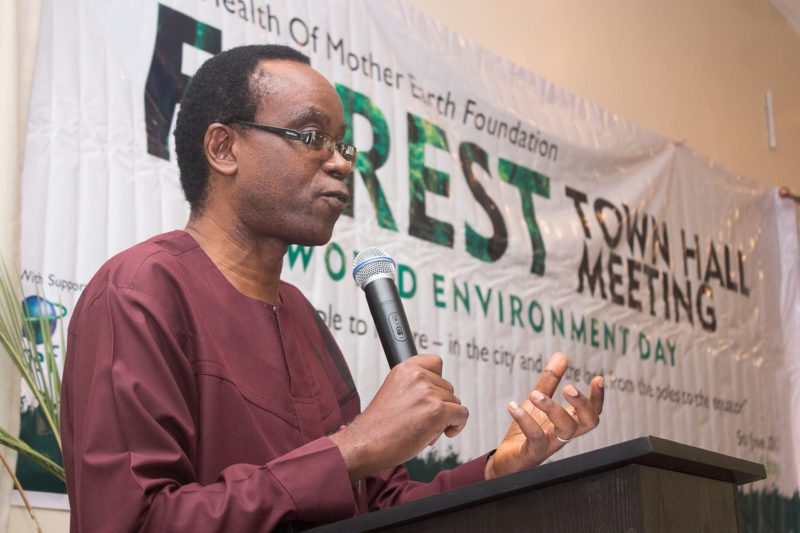Nigeria’s Food Sovereignty at Risk: HOMEF’s Director Calls for Rejection of GMOs, Decolonization of Agriculture

By Ekemini Simon
Nigeria stands at a critical juncture in its quest for food sovereignty, with experts warning that the introduction of genetically modified organisms (GMOs) poses a significant threat to the country’s agricultural system and food security.
At a national symposium on GMOs held in Abuja, the Executive Director of the Health of Mother Earth Foundation (HOMEF), Nnimmo Bassey called for a rejection of GMOs and a decolonization of Nigeria’s agricultural system.
Bassey argued that GMOs represent a paradigm shift in agriculture, one that prioritizes profits over people and the environment. He noted that GMOs have not been proven to increase food production, citing the example of Tanzania, which achieved food sufficiency without GMOs by supporting local farmers and promoting organic food production.
The introduction of GMOs in Nigeria, Bassey said, is a result of a flawed governmental approach that prioritizes the interests of corporate entities over those of local farmers and the environment. He criticized the National Biosafety Management Agency (NBMA) Act and the National Biotechnology Development Agency (NABDA) for promoting GMOs without adequate regulation and oversight. He said “These two agencies of government cannot be excused for seeing themselves as infallible and even as being the government itself. They may be a part of government, but they are not the government.
“They falsely see GMOs as a one size fits all solution, virtually forget other areas of modern biotechnology and set their eyes only on gutting our agricultural and food systems. Solutions such as the genetic engineering of plants/animals do not address these root causes and we should be worried that there is such an adamant push to entrench them in our food systems by the producers and their allies in government. There is obviously an open conspiracy to counter our best interests while locking in colonial controls over our agricultural and food systems.”
Bassey also highlighted the risks associated with GMOs, including the loss of genetic diversity, dependence on corporate seed entities, and potential harm to human and environmental health. He called for a moratorium on all types of agricultural modern biotechnology, citing the need to protect Nigeria’s biodiversity and food heritage.
To achieve food sovereignty, Bassey advocated for a decolonized agricultural system that prioritizes support systems for farmers, preserves local varieties, and promotes sustainable agriculture practices. He emphasized the need for farmers to be at the forefront of agricultural policy and for the government to prioritize the precautionary principle in biosafety issues.
He added ” GMOs represent the subversion of Africa’s food systems which was intentionally constructed through the colonization of thought, a phenomenon concretized through persistent coloniality of knowledge and power. You may wonder why anyone would subvert another’s food system. The reasons for this are many. The colonizers think and act in their own interests. This subversion covers every area of production and ensures that labour is not invested for meeting local needs while expanding and consolidating labour to meet the needs of the colonizers.
“By emphasizing a cash economy, for instance, farmers are forced to neglect their own nutritional needs, and are derided as subsistence farmers, and are made to offer their labour in exchange for meager wages. When the exploiting colonizers are kind, they turn the farmers into mere out growers who own nothing, are given seeds to cultivate and are thereafter given a fraction of the harvests. The colonial powers scored double on this count by introducing slavish plantation agriculture which grabs lands, displaces communities and offers locals menial jobs as farm hands or guards.
“Colonial agriculture thrived not only by producing crops for export, but it also benefited from altering the appetites of the colonized. These changes did not happen only through advertisements; the indigenous foods were denigrated as uncivilized and sometimes simply forgotten due to a chronic absence of the crops or ingredients for preparing the foods. Today, the erosion of varieties is exacerbated by many related factors including genetic manipulations, hybridization of crop varieties, prevalence of junk foods and hostile seed laws.”
The symposium highlighted the urgent need for Nigeria to take a bold step towards a more sustainable and equitable agricultural system. As the country navigates the complexities of food security and sovereignty, experts are calling for a rejection of GMOs and a commitment to decolonizing agriculture.







